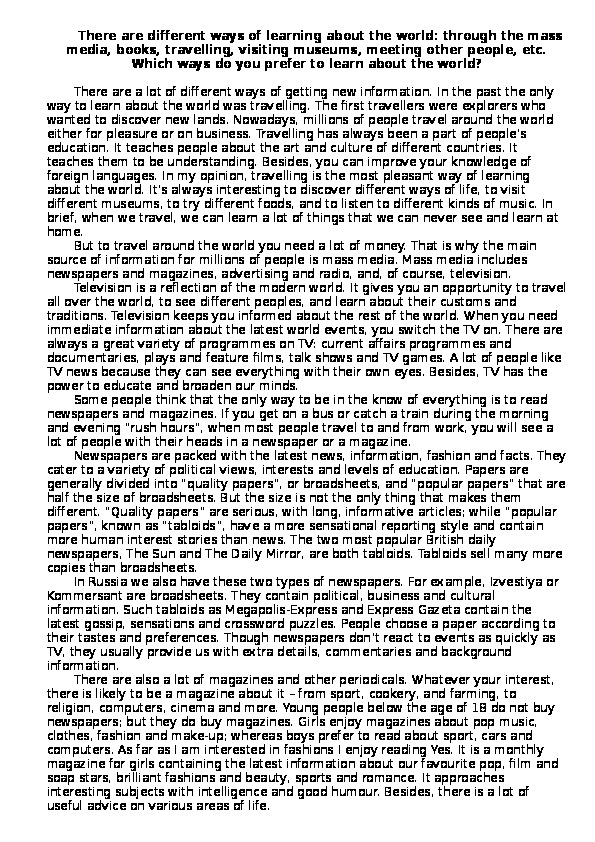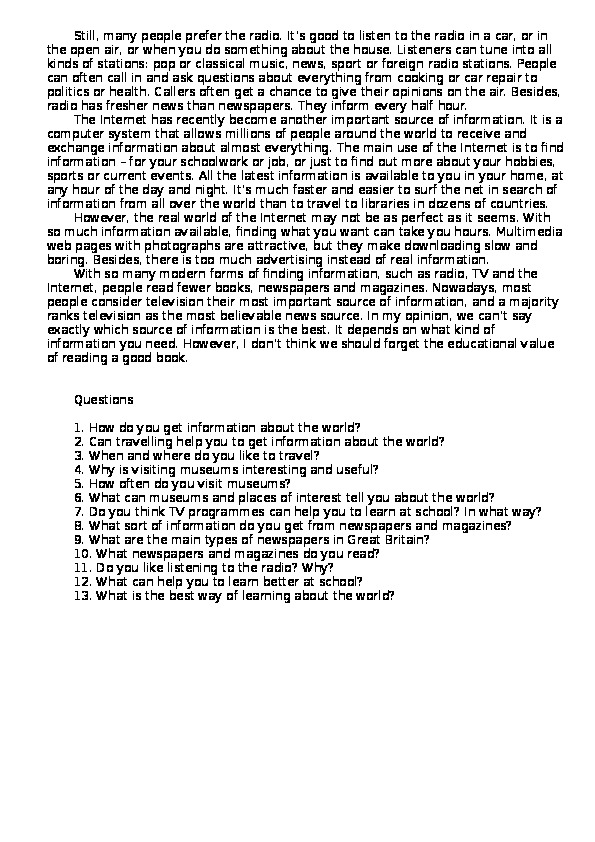Существуют разные способы познания мира: через средства массовой информации, книги, путешествия, посещение музеев, встречи с другими людьми и т. Д. Какие способы вы предпочитаете узнать о мире? Представлен текст о способах познания мира. Используется cложная лексика по теме " Mass Media" и выражения введения конкретизации мысли. После текста предлагается ряд вопросов по работе с основным содержанием текста.Существуют разные способы познания мира: через средства массовой информации, книги, путешествия, посещение музеев, встречи с другими людьми и т. Д. Какие способы вы предпочитаете узнать о мире? Представлен текст о способах познания мира. Используется cложная лексика по теме " Mass Media" и выражения введения конкретизации мысли. После текста предлагается ряд вопросов по работе с основным содержанием текста.
There are different ways of learning about the world: through the mass
media, books, travelling, visiting museums, meeting other people, etc.
Which ways do you prefer to learn about the world?
But to travel around the world you need a lot of money. That is why the main
There are a lot of different ways of getting new information. In the past the only
way to learn about the world was travelling. The first travellers were explorers who
wanted to discover new lands. Nowadays, millions of people travel around the world
either for pleasure or on business. Travelling has always been a part of people’s
education. It teaches people about the art and culture of different countries. It
teaches them to be understanding. Besides, you can improve your knowledge of
foreign languages. In my opinion, travelling is the most pleasant way of learning
about the world. It’s always interesting to discover different ways of life, to visit
different museums, to try different foods, and to listen to different kinds of music. In
brief, when we travel, we can learn a lot of things that we can never see and learn at
home.
source of information for millions of people is mass media. Mass media includes
newspapers and magazines, advertising and radio, and, of course, television.
Television is a reflection of the modern world. It gives you an opportunity to travel
all over the world, to see different peoples, and learn about their customs and
traditions. Television keeps you informed about the rest of the world. When you need
immediate information about the latest world events, you switch the TV on. There are
always a great variety of programmes on TV: current affairs programmes and
documentaries, plays and feature films, talk shows and TV games. A lot of people like
TV news because they can see everything with their own eyes. Besides, TV has the
power to educate and broaden our minds.
Some people think that the only way to be in the know of everything is to read
newspapers and magazines. If you get on a bus or catch a train during the morning
and evening “rush hours”, when most people travel to and from work, you will see a
lot of people with their heads in a newspaper or a magazine.
Newspapers are packed with the latest news, information, fashion and facts. They
cater to a variety of political views, interests and levels of education. Papers are
generally divided into “quality papers”, or broadsheets, and “popular papers” that are
half the size of broadsheets. But the size is not the only thing that makes them
different. “Quality papers” are serious, with long, informative articles; while “popular
papers”, known as “tabloids”, have a more sensational reporting style and contain
more human interest stories than news. The two most popular British daily
newspapers, The Sun and The Daily Mirror, are both tabloids. Tabloids sell many more
copies than broadsheets.
In Russia we also have these two types of newspapers. For example, Izvestiya or
Kommersant are broadsheets. They contain political, business and cultural
information. Such tabloids as Megapolis-Express and Express Gazeta contain the
latest gossip, sensations and crossword puzzles. People choose a paper according to
their tastes and preferences. Though newspapers don’t react to events as quickly as
TV, they usually provide us with extra details, commentaries and background
information.
There are also a lot of magazines and other periodicals. Whatever your interest,
there is likely to be a magazine about it – from sport, cookery, and farming, to
religion, computers, cinema and more. Young people below the age of 18 do not buy
newspapers; but they do buy magazines. Girls enjoy magazines about pop music,
clothes, fashion and make-up; whereas boys prefer to read about sport, cars and
computers. As far as I am interested in fashions I enjoy reading Yes. It is a monthly
magazine for girls containing the latest information about our favourite pop, film and
soap stars, brilliant fashions and beauty, sports and romance. It approaches
interesting subjects with intelligence and good humour. Besides, there is a lot of
useful advice on various areas of life.Still, many people prefer the radio. It’s good to listen to the radio in a car, or in
the open air, or when you do something about the house. Listeners can tune into all
kinds of stations: pop or classical music, news, sport or foreign radio stations. People
can often call in and ask questions about everything from cooking or car repair to
politics or health. Callers often get a chance to give their opinions on the air. Besides,
radio has fresher news than newspapers. They inform every half hour.
The Internet has recently become another important source of information. It is a
computer system that allows millions of people around the world to receive and
exchange information about almost everything. The main use of the Internet is to find
information – for your schoolwork or job, or just to find out more about your hobbies,
sports or current events. All the latest information is available to you in your home, at
any hour of the day and night. It’s much faster and easier to surf the net in search of
information from all over the world than to travel to libraries in dozens of countries.
However, the real world of the Internet may not be as perfect as it seems. With
so much information available, finding what you want can take you hours. Multimedia
web pages with photographs are attractive, but they make downloading slow and
boring. Besides, there is too much advertising instead of real information.
With so many modern forms of finding information, such as radio, TV and the
Internet, people read fewer books, newspapers and magazines. Nowadays, most
people consider television their most important source of information, and a majority
ranks television as the most believable news source. In my opinion, we can’t say
exactly which source of information is the best. It depends on what kind of
information you need. However, I don’t think we should forget the educational value
of reading a good book.
Questions
1. How do you get information about the world?
2. Can travelling help you to get information about the world?
3. When and where do you like to travel?
4. Why is visiting museums interesting and useful?
5. How often do you visit museums?
6. What can museums and places of interest tell you about the world?
7. Do you think TV programmes can help you to learn at school? In what way?
8. What sort of information do you get from newspapers and magazines?
9. What are the main types of newspapers in Great Britain?
10. What newspapers and magazines do you read?
11. Do you like listening to the radio? Why?
12. What can help you to learn better at school?
13. What is the best way of learning about the world?


